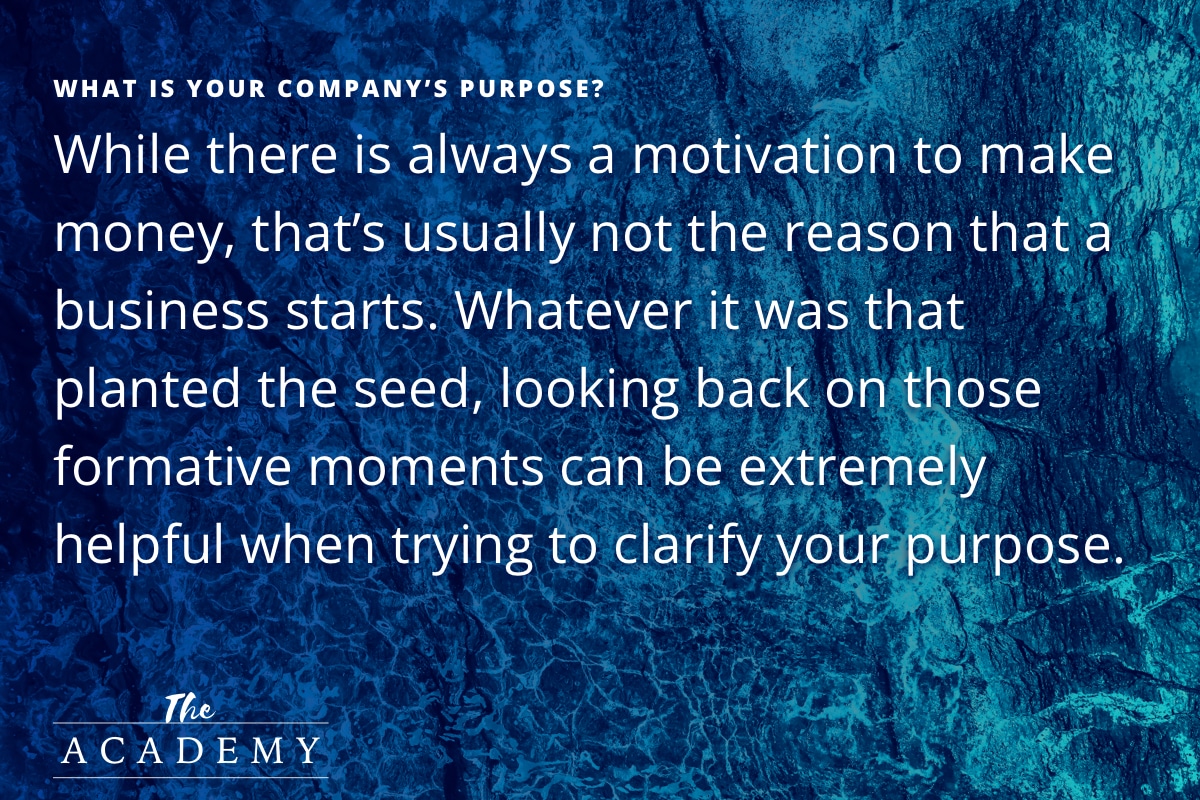
It’s easy to overlook the importance of clearly defining the purpose of your company and the goals it is trying to achieve. When you first get started, you are probably more worried about simply making a sale and establishing yourself in the market than anything else. And once the wheels start turning, you quickly get busy and have little time to step back and think about the bigger picture.
We encourage you to take a moment out to see the bigger picture and understand how defining your purpose and goals can help drive your business forward. Specifically, it’s the clarity of having these pieces in place that will help you make decisions that are in your company’s best interests. This article should provide you with the motivation and direction needed to create or improve on these two essential components to growing your business.
Why Purpose and Goals Matter
The primary, big picture objective for any for-profit business is to, well, turn a profit. If your organization is in business to make money, it makes sense that you would place your focus on that money above all else. Plenty of non-profit organizations exist to work toward some greater good, and those are very important to society, but things are different in the world of for-profit business. Here, it’s all about the bottom line.
Or is it? Sure, you have to be focused on making money, but a singular focus on that ultimate target alone could cause you to get off track. This is where we need to start to think about both the purpose of your company and the goals that you want to achieve. Let’s take a closer look at what we mean by purpose and goals, and how those two things are different.
Company Purpose
The easiest way to think about your company’s purpose is to define it as the reason that your company exists. And no, it’s not good enough to say that your company exists to make money. That’s true for any for-profit endeavor, so saying that you want to make money doesn’t really provide anything in terms of guidance for future decisions.
Rather than centering your purpose on financial objectives, you should center it on what it is that you aim to achieve for your customers. It’s a little trickier than you might imagine to clearly determine and define your purpose, so we’ll dedicate a section of this article below to gaining further clarity on this topic.
Business Goals
While it might sound like the same thing at first, goals are not the same as a purpose for your business. When talking about the goals you are going to set and strive for, we are talking about the guiding metrics that direct your actions and help you continue to fulfill the purpose of your operation.
We’ll also get deeper into how goal setting for your business works later on, but the key takeaway here is that business goals are specific objectives that you establish and monitor to compare your results to what you hoped to achieve.
The blend of a clear purpose and well-established goals can mean powerful things for a business. In the absence of these elements, you’ll somewhat be driving in the dark with the decisions you make on a day-to-day basis. After all, if you don’t know where you are trying to go or what you are trying to achieve, what will be the foundation for your choices? Turning back to your purpose or goals each time an important decision arises can keep you on the track and running in the right lane.
What is Your Company’s Purpose?
The title of this section is a deceptively simple question that will be much harder to answer than you might think at first. For instance, a taco truck business might first think that the purpose of the business is to “sell tacos”, but that doesn’t really quite cover it. A more accurate assessment of the business could be found in one of these points:
- To provide fresh, healthy, quick lunch options to busy professionals in a big city
- Offer authentic cuisine to tourists in a travel destination
- Add to the community feel of local events by serving hungry families
These are just examples, of course, but they get closer to the heart of what we are talking about when discussing a company’s purpose. These three ideas don’t mention anything about the tacos specifically, like the ingredients used or how they are prepared. Those are details that aren’t suited for a company purpose statement.
Instead, we are talking here about what the business will do for its customers. It might help busy workers find something tasty for lunch that doesn’t come from a standard fast-food restaurant. Or it might be out at events or in tourist areas, making customers happy and enriching their experience. Those are the kinds of things that make up a purpose, and you can then build goals around that purpose to keep your operation on track.
Figuring out the ideal, ultimate purpose for your business can become easier if you look back and think about why the business started in the first place. What was the impetus for getting this venture off the ground? While there is always a motivation to make money, that’s usually not the reason that a business starts. More often, someone discovers they have a talent or skill that might be useful to others, and they decide to see if it can become a business.

So, for our taco truck, maybe the owner cooked for family and friends and was always complimented on the quality of the food. Or maybe those same family members and friends talked about how they can’t find such good food anywhere around town during the work week, or when they are traveling. Whatever it was that planted the seed for starting a business, looking back on those formative moments can be extremely helpful when trying to clarify your purpose.
In addition to thinking back to the roots of your business, also talk to your current customers for even more insight about your purpose. Specifically, find out what caused your customers to pick you over the competition. Are there any themes that stick out? When you find out more about who you are serving and why they like you so much, you’ll suddenly have a clear picture of what it is you exist to do.
What Are Your Business Goals?

If you can get your hands around a clear purpose for your business, the next step is to think about how clearly defined goals can play into fulfilling that purpose. Goals will vary wildly from one business to the next, but there are some themes that are seen over and over again in various industries.
Here are some places to start:
- Set an objective for how many new leads you wish to acquire in a given month or quarter. Some percentage of your leads will turn into sales, and if you know what that percentage is for your business, you can set a meaningful leads target that will help you keep money flowing
- You might also wish to set an objective for how many new products or services you will bring to market in the coming year. Such a goal will keep you focused on continuing to innovate and not being satisfied with the status quo
- Resist centering your goals on actual sales or revenue, as those tend to be trailing indicators of things that have been done well previously. So, focusing on the above notions of new leads or new products tends to be a better way to center your goals
There are plenty of possible goals that our sample taco truck could use to move forward. For instance, it might be a target to create one new menu item each month, perhaps adjusting the offering seasonally while keeping the favorites on the menu throughout the year. Or, the truck could make it a goal to visit one new location each quarter, testing the results at those new locales while still making regular stops at the places that have proven to be winners in the past.
These simple goals will help the business avoid getting stale and falling into a rut of doing the same old things until those things start to not work as well as they once did.
Strike a Balance Between Short and Long-Term Goals
As you build your list of goals, you might find that it is hard to strike a balance between short-term and long-term objectives. Some goals are targets that you are hoping to hit this month, or even this week, while others won’t be decided for many years to come. So, how do you walk the line and leave yourself with enough of each type of goal to keep you on track?
For a good starting point, always give priority to those goals that are going to be pursued in the short term. What you do over the course of your days is what you do with your life, as the saying goes. So, if you are focused on quality short-term goals, it’s likely that you will wind up going in a desirable direction for the long run, as well.
Of course, that doesn’t mean you should avoid long-term goals, as they are also valuable. Consider setting just one or two goals that fall into the long-term category, and then support those goals with a longer list of objectives for the weeks and months in front of you.
It will likely take some practice and experimentation to dial in your goals in a way that makes sense for your business. Don’t give up on goal setting just because it feels challenging at first. It will get easier and it will start to pay off in a bigger way down the line. Continue to set new goals, revise older goals, and make sure everything is pointing toward the purpose that you have clearly defined for your company.
Detailing your purpose and goals in a formal manner might not ever seem like an urgent task, but you should treat it as such in order to drive your business further. There are many benefits to be enjoyed after going through this exercise, and you are sure to learn a lot about your business in the process.
Good luck with this project, and here’s to reaching new heights in the years to come!
Most Popular Articles

Seeing Favicons in Your Google Search Results? Here’s Why…
Have you noticed anything different in your Google Search results lately? Google added tiny favicon icons to its organic search results in January. It was…

Business Growth and Digital Marketing News & Tips 11-17-24
Are you encouraging and rewarding innovation? Lee Cockerell is the former Executive Vice President of Operations at Walt Disney World. A lover of traditional red…

Business Growth and Digital Marketing News & Tips 11-27-24
A culture of gratitude "Feeling gratitude and not expressing it is like wrapping a present and not giving it." – William Arthur Ward Beyond being…








